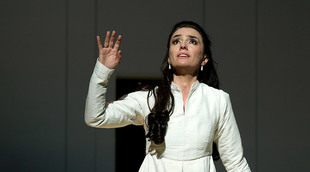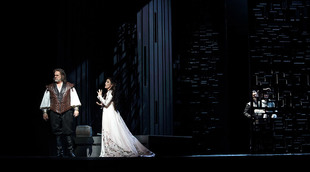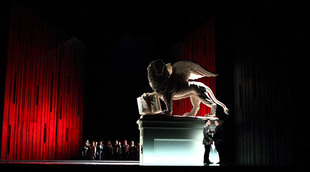 © Catherine Ashmore
© Catherine Ashmore
Like the Shakespeare play upon which it is based, Giuseppe Verdi’s penultimate opera Otello of 1887 is the story of a general in the Venetian military whose skills in managing political and personal affairs do not match those he has demonstrated in fighting. When his ensign Iago feels Otello has sidelined him for promotion, he lays a trap to make Otello believe his wife Desdemona has been unfaithful, and the general falls whole-heartedly for the deception with disastrous consequences.
When Keith Warner’s production first came to the Royal Opera in 2017, much effort went into ensuring it was a big deal with the services of Jonas Kaufmann being secured in the title role and a live cinema screening constituting part of the run. It was still designed to enjoy many revivals, but two years ago the focus seemed to be on getting everything right first time around, with the hope that doing so would mean the revivals took care of themselves. If that is so, it must be said that this first one certainly does as it boasts a fantastic cast that delivers handsomely on both the singing and acting.
Gregory Kunde’s portrayal of Otello may feel quite straight forward, but it is highly effective because it cuts right to the heart of the character. The whole point of the general is that the traits that have served him so well in battle, namely courage, quick decision-making and unswerving belief, prove ill suited to managing domestic relationships, but we have to feel his attributes for ourselves. This is because it is only moving to see a man defeated by himself if we can appreciate what a bold lion he is in the first place. Kunde certainly makes him so while delivering singing of the utmost strength.
Carlos Álvarez, who played Simon Boccanegra at the Royal Opera House last year, is a brilliantly malevolent Iago who, with his strong, consistent and sufficiently dark baritone, plays everyone else with such apparent ease. Ermonela Jaho provides an extremely sensitive portrayal of Desdemona with a soft, glistening and yet still sufficiently powerful soprano. In their scene alone together in Act I she acts as brilliant foil to Otello, as his naturally bullish character contrasts with her sweeter nature, and on this occasion she does succeed in soothing him. There is also excellent support from Freddie de Tommaso as Cassio, Andrés Presno as Roderigo and Catherine Carby as Emilia.

Ermonela Jaho as Desdemona in Otello
(C) ROH 2019, by Catherine Ashmore

Gregory Kunde as Otello and Ermonela Jaho as Desdemona in Otello
(C) ROH 2019, by Catherine Ashmore
The production remains serviceable rather than outstanding. Kaspar Glarner’s costumes are naturalistic, while Boris Kudlička’s sets are designed not to aid the opera’s context (it is set in Cyprus) so much as its drama and emotion. Sliding diagonal walls condense the performance area so that the large chorus at the start feels just as overwhelming visually as it does vocally, because it is packed into so tight a space. The generally low-lit stage, courtesy of Bruno Poet, contrasts with highly illuminated faces and bodies, thus heightening the sense of tension through the use of chiaroscuro, and alluding to Otello’s ‘black and white’ understanding of matters.
However, because the staging tends to make the action devoid of any specific context (although there are Venetian symbols and ‘filigreed’ windows that allude to Moorish architecture), it has to move us precisely by generating drama and emotion. Although it creates plenty of the former, it is harder for us to feel as much of the latter. The direction may help us to understand how one powerful man’s distrust and stupidity can lead to tragedy and the shaking of an entire society, but it is hard to feel destabilised and sickened as we watch the situation unravel before our eyes. Because we fail to connect with the specific circumstances under which a fifteenth century general would naturally trust his ensign Iago without question, or grasp why it is so terrible for the captain Cassio to become drunk in public (even before he turns violent) because of the threat to military discipline, it is hard to feel embraced by the world we see before us.
Nevertheless, there are plenty of thoughtful touches that sustain our interest. For example, the curtain rises on Iago brandishing two theatrical masks before casting the comic one aside and retaining the tragic one. This is interesting because the action suggests that he chooses to pursue the path of evil, and thus undermines his words in ‘Credo in un Dio crudel’. These imply that he is predisposed to believe in a cruel God, and would thus absolve him of some responsibility for his behaviour. However, when as he sings the aria he casts the second mask aside he reveals there are no theatrics left, but only evil pure and simple.
It is also notable that as Otello and Desdemona settle down together at the end of ‘Già nella notte densa s’estingue ogni clamor’ Iago pushes the room they are in off the stage, as if he has them trapped exactly where he wants them and will move them as he pleases from there. Nevertheless, with Sir Antonio Pappano’s conducting also proving mightily impressive, it is ultimately the musical credentials of this first revival that make it such an enjoyable and impactful evening.
By Sam Smith
Otello | 9 – 22 December 2019 | Royal Opera House, Covent Garden
the 11 of December, 2019 | Print

Comments